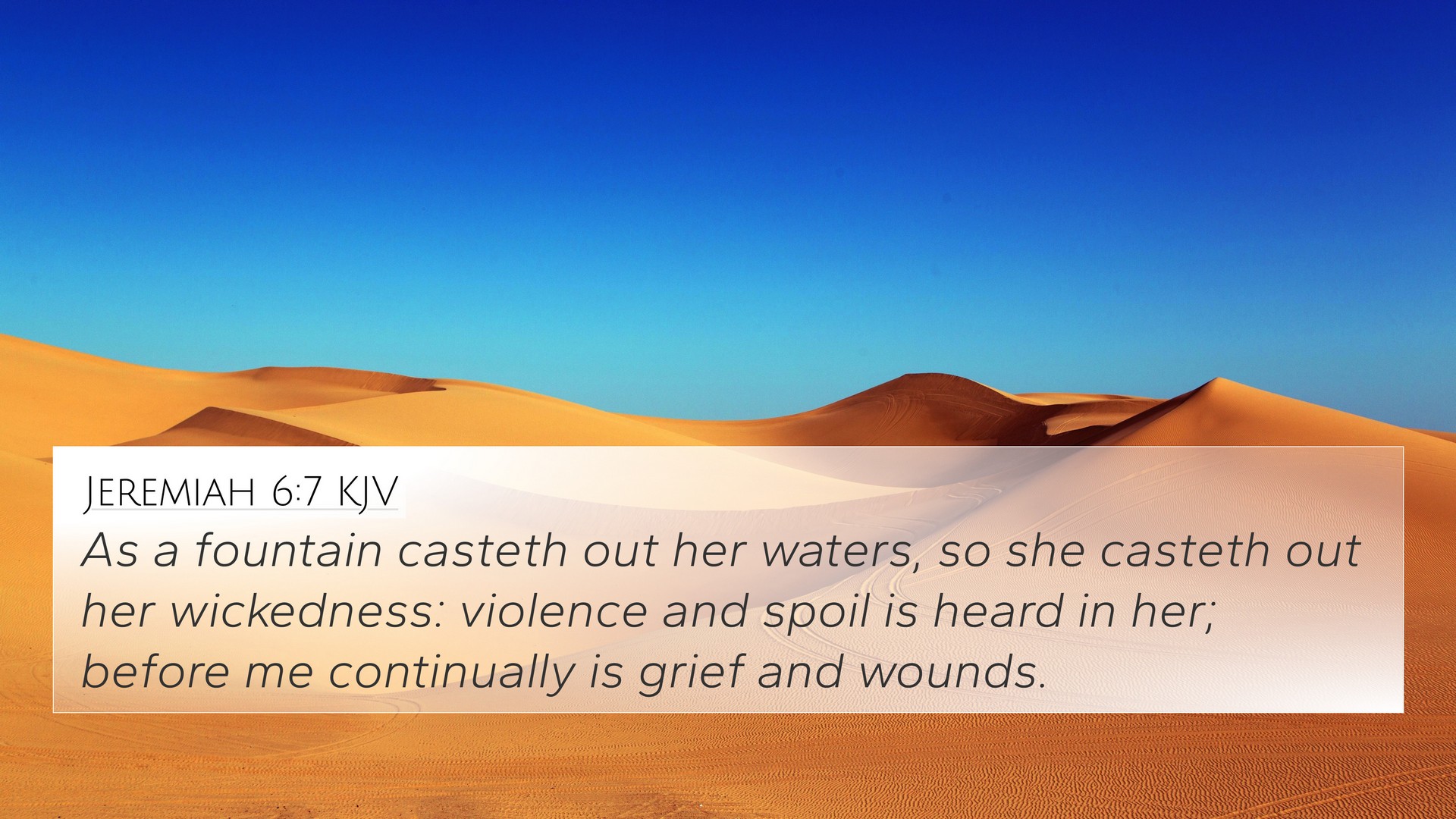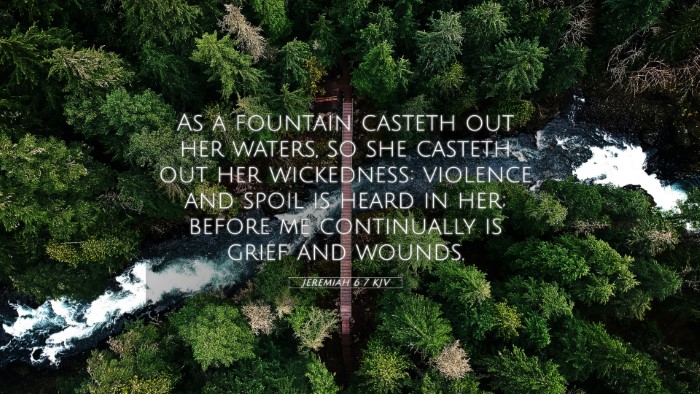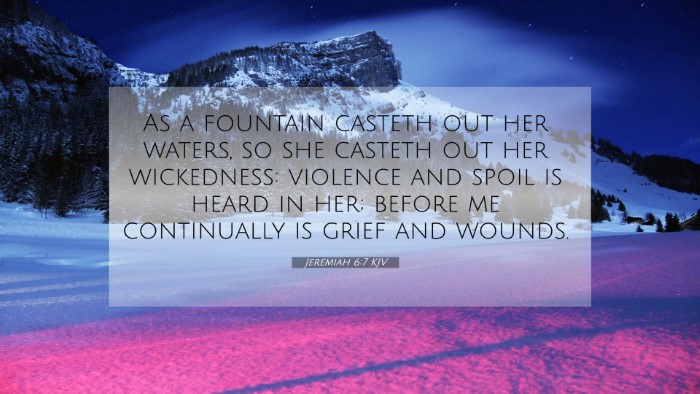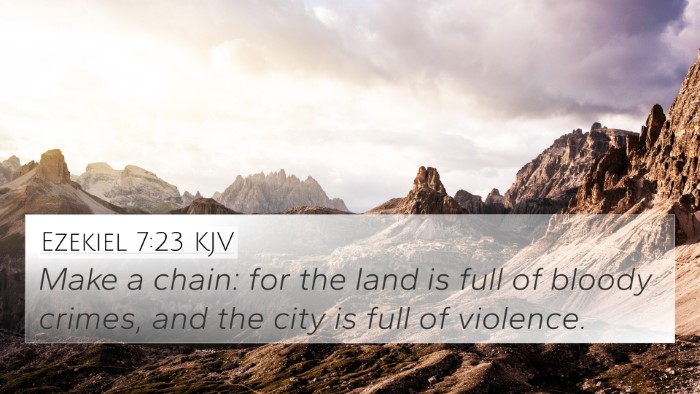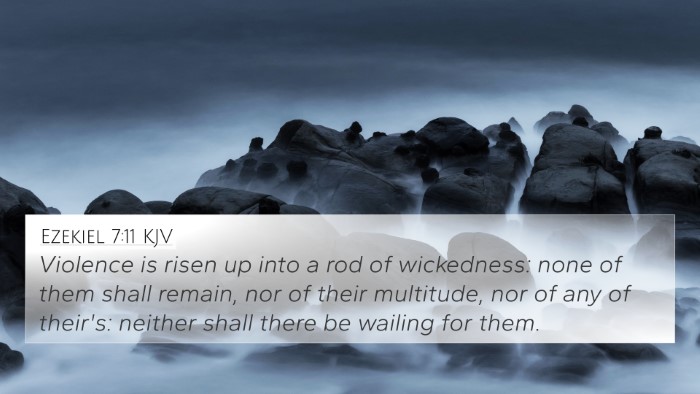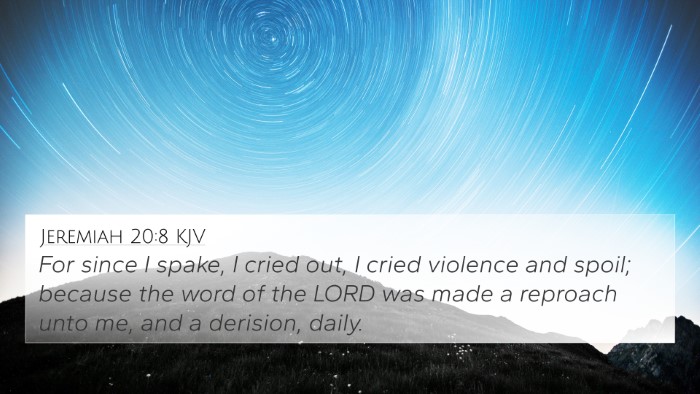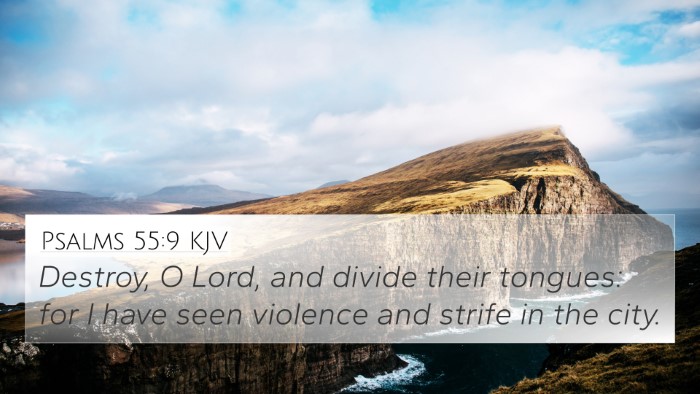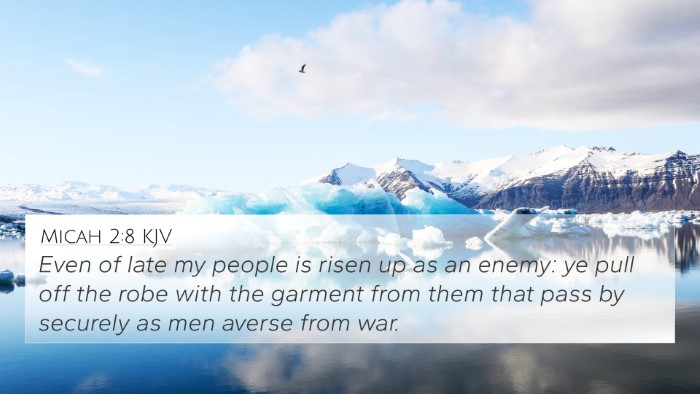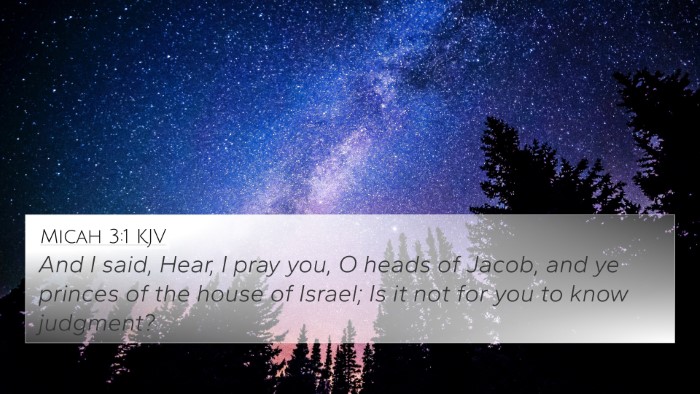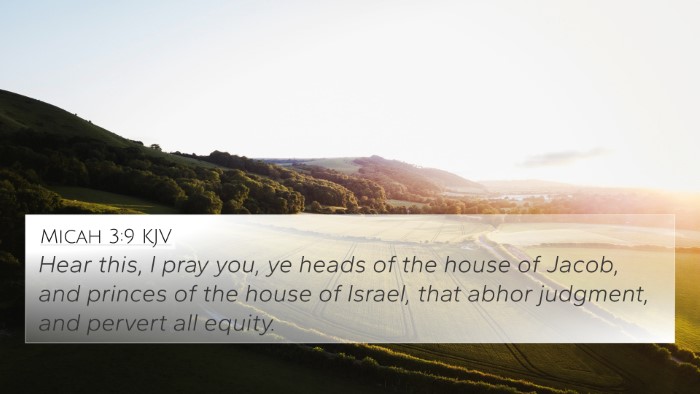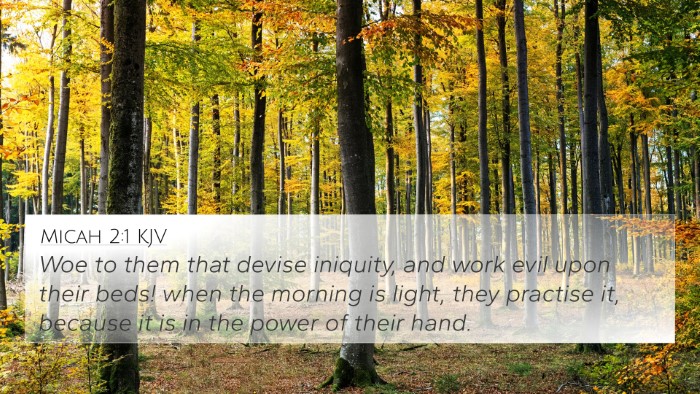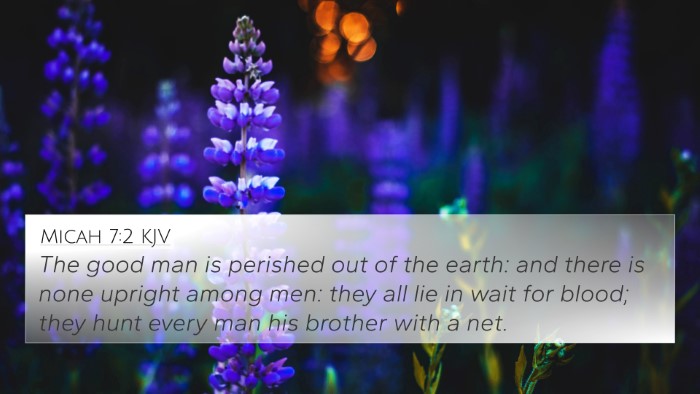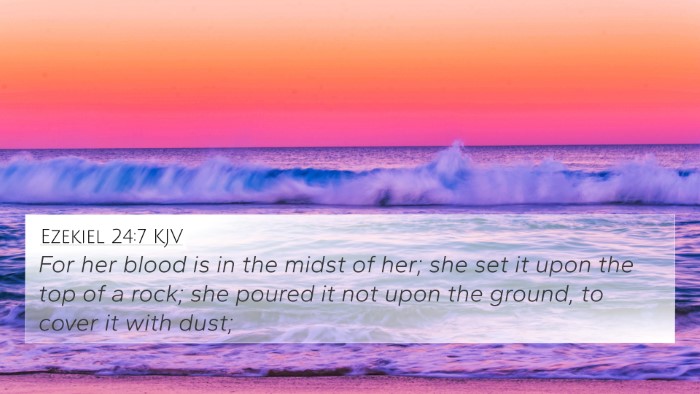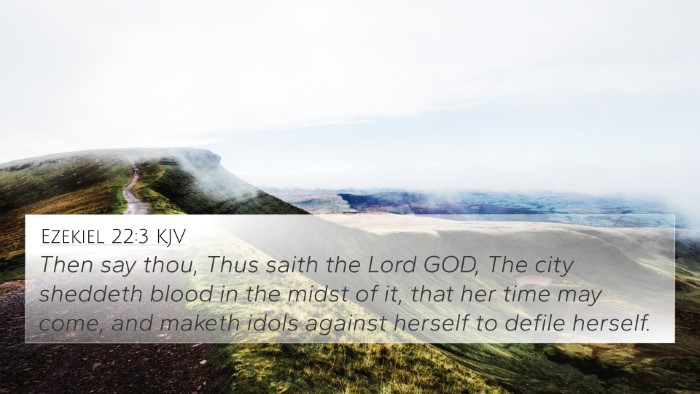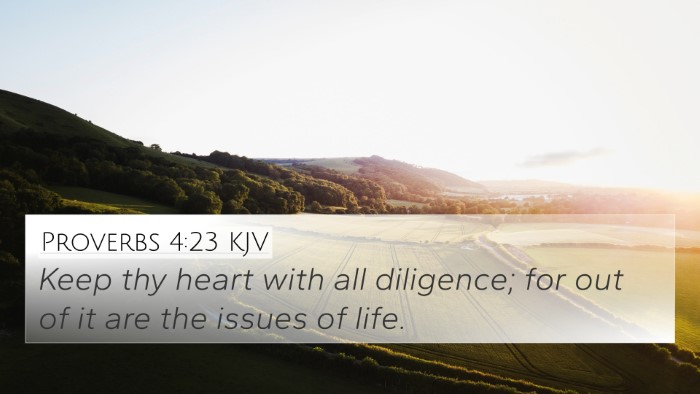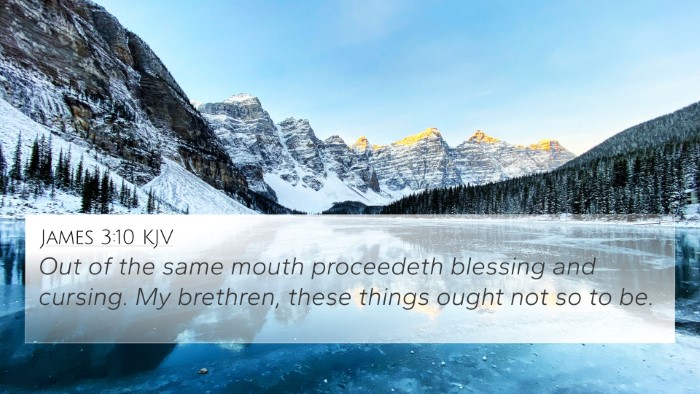Understanding Jeremiah 6:7
Jeremiah 6:7 states, "As a fountain casteth out her waters, so she casteth out her wickedness: violence and spoil is heard in her; before me continually is grief and wounds." This verse encapsulates the gravity of Jerusalem's spiritual and moral decay, symbolized through the image of a fountain.
Verse Meaning and Commentary
This verse can be dissected to understand not only the historical context but also the theological implications it carries in light of scripture.
Symbolism of the Fountain
Matthew Henry emphasizes that the “fountain” signifies the abundance of sin emerging from the inhabitants of Jerusalem. Just as a fountain constantly produces water, the wickedness of the city flows outward, impacting all who come into contact with it.
Albert Barnes notes that this imagery serves to depict the natural and unrestrained outflow of evil, parallel to how a fountain ceaselessly pours forth water. This connection illustrates the relentlessness of violence and oppression that the Prophet Jeremiah condemns.
Adam Clarke points out that the “wickedness” referred to is not just individual transgressions but a collective societal ailment that manifests in systemic violence and corruption.
Grief and Wounds
The latter part of the verse refers to God's continuous grief over His people’s trespasses. This aligns with the biblical theme of God’s sorrow over sin, as seen in Genesis 6:6, where the Creator regretted making man due to his wickedness.
Henry also suggests that the “grief and wounds” signify the injuries that the people inflict upon one another and the pain inflicted on God, who longs for their repentance and restoration.
Cross-References for Deeper Understanding
To seize a holistic view of Jeremiah 6:7, one can explore the following Bible verses that exhibit thematic similarities:
- Isaiah 1:15: Highlights the futility of empty rituals amid widespread injustice.
- Ezekiel 18:30: Calls the people to repentance, emphasizing the need for a change of heart.
- Matthew 23:37: Jesus laments over Jerusalem, echoing God's grief.
- James 4:1: Discusses the source of conflicts arising from desires within.
- Micah 2:1-2: Describes the evil desires leading to violence and oppression.
- Proverbs 14:34: Righteousness exalts a nation, while sin brings shame and turmoil.
- Luke 13:34: Further emphasizes God’s sorrow over Jerusalem's unwillingness to repent.
Thematic Connections in Scripture
The themes present in Jeremiah 6:7 intersect with other scripture passages, highlighting the pervasive nature of sin and the divine response to human transgression. Each cross-referenced passage provides a unique perspective on the resulting consequences of sin and the overarching need for redemption through repentance.
Inter-Biblical Dialogue
This verse necessitates a comprehensive cross-referencing Bible study approach. By linking related scriptures, one can find deeper connections and contextual insights. This method is invaluable for sermon preparation, teaching, and personal study. The desire for God to restore His people is a constant thread throughout the Bible, underscoring His mercy amid humanity's shortcomings.
Tools for Bible Cross-Referencing
Utilizing tools for Bible cross-referencing enhances one’s ability to perform a more substantial comparative Bible verse analysis. Here are some helpful tools and practices:
- Bible Concordance: Helps locate verses and topics swiftly.
- Bible Cross-Reference Guide: Provides a systematic approach to studying themes across texts.
- Cross-Reference Bible Study: Encourages connections between different parts of scripture.
- Bible Reference Resources: Books and online tools that assist in understanding scripture relations.
Conclusion
Jeremiah 6:7 serves as a poignant reminder of the weight of sin and the need for repentance. By engaging in inter-Biblical dialogue through cross-referencing, one can experience a richer understanding of God's message and purpose throughout the scriptures. This process enables believers to see the interconnectedness of their faith and the continuity of God’s redemptive plan across both the Old and New Testaments.
Further Study Recommendations
For those interested in delving deeper into the themes of Jeremiah 6:7, the following studies are recommended:
- Explore the historical backdrop of Jeremiah's prophecies.
- Investigate the relationship between Old Testament prophetic literature and New Testament teachings.
- Engage with thematic studies focusing on repentance and God's desire for restoration.
- Utilize Bible chain references to explore related books and chapters.
Understanding Jeremiah 6:7 through the lens of these insights promotes a comprehensive grasp of the text, offering guidance for personal reflection, group study, and preaching.
